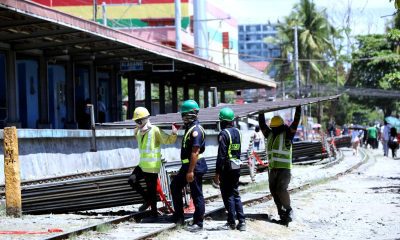News
CHR lauds passage of anti-hospital deposit law

In a statement posted in the commission’s website, CHR spokesperson, Atty. Jacqueline Ann de Guia, said its passage “advances every Filipino’s right to health or more specifically, broadening (widening or opening) the acces to urgent or emergency health services.” (Photo By The Commission on Human Rights of the Philippines – The Commission on Human Rights of the Philippines, Public Domain)
MANILA, Aug. 10 — The Commission on Human Rights (CHR) has lauded the passage of a law increasing the penalties for hospitals and clinics that refuse to give initial medical treatment in emergency or serious cases.
This developed after Republic Act No. 10932, or the “Anti-Hospital Deposit Law”, was recently signed into law by President Rodrigo Duterte.
In a statement posted in the commission’s website, CHR spokesperson, Atty. Jacqueline Ann de Guia, said its passage “advances every Filipino’s right to health or more specifically, broadening (widening or opening) the access to urgent or emergency health services”.
De Guia said the 1987 Philippine Constitution, under Article 13, Section 11, states that priority shall be given to “the needs of the under-privileged, sick, elderly, disabled, women, and children” and that the State shall “endeavor to provide free medical care to paupers”.
In addition, the United Nations International Covenant on Economic, Social and Cultural Rights, which the Philippines is a State Party to, emphasizes in Article 12.2-D that the State must ensure “the creation of conditions which would assure to all medical service and medical attention in the event of sickness”, she said.
De Guia noted that equality and non-discrimination are fundamental human rights principles and critical components of the right to health.
”Making it unlawful for a hospital or clinic to request, solicit, demand or accept any deposit or any other form of advance payment as a prerequisite for administering basic emergency care to any patient is a necessary safeguard to guarantee that no patient is being discriminated against based on his/her economic status, as the statistics on sickness and need for services among poor populations are staggering,” she said.
The commission supports the government in enacting concrete legislations that provide people better access to decent and adequate health facilities and services, she said, adding that the passage of RA 10932 shows the current administration’s “political and moral will to address the issue of health care, and does take cognizance of basic human rights concerns of Filipinos”.
“The CHR commends the authors of the new law, as well as the President for signing it, affirming the State’s obligation to uphold everyone’s right to health,” she said.
The commission also acknowledged that this positive news may have some economic impact on both public and private hospital institutions in terms of their operational expenses.
“Through open communication and continuous dialogue, the CHR hopes that the government, hospital associations, and patient support groups will come up with a consensus to sustainably implement the law to serve the best interests of the public,” he said.
Despite these positive developments, de Guia said the commission will continue to be proactive and vigilant in both monitoring the developments of rules and regulations for RA 10932, as well as in pushing for other bills that would lead to a better health care system for the country.
“It is our hope that our legal and policy frameworks continue to include the protection of rights that would lead to a life of wellness and dignity for all,” she said.
The new law states that any official, medical practitioner or employee of a hospital or medical clinic found to have violated the provisions of the Act shall face a prison term of six months and one day to two years and four months or a fine of PHP100,000 to PHP300,000, or both, at the discretion of the court.
Higher penalties of imprisonment of four to six years, or a fine of PHP500,000 to PHP1 million, or both, will be imposed on directors or officers of hospitals or clinics responsible for the formulation and implementation of policies or instructions that violate this Act.
Three repeated violations will result in the revocation of the health facility’s license to operate by the Department of Health.





















